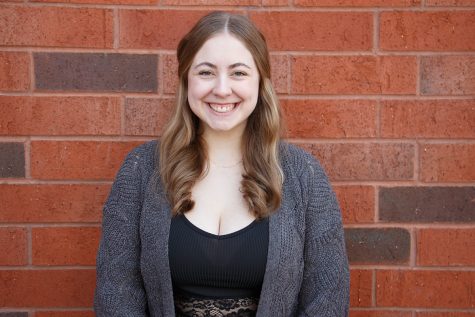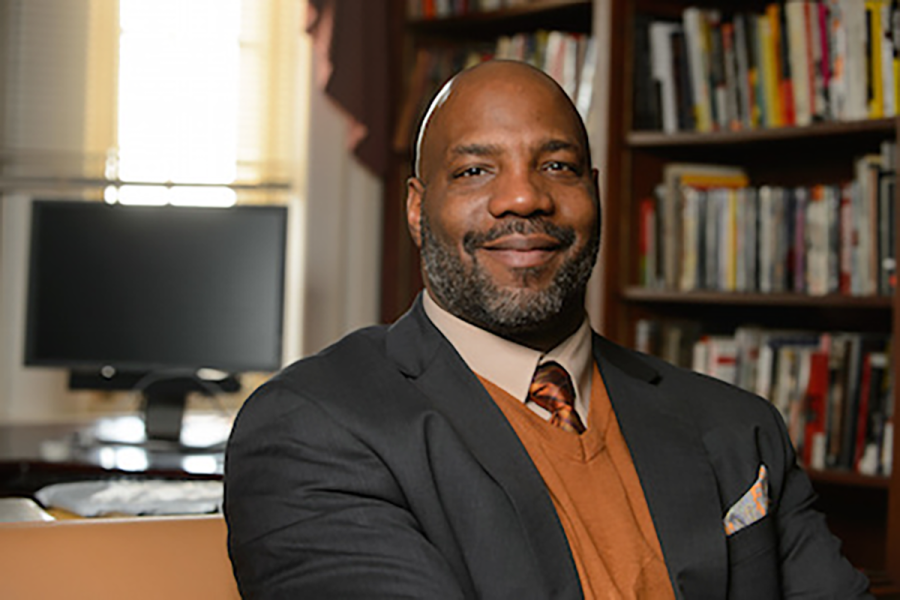Jelani Cobb shares his stories with UW-Eau Claire students and faculty
Jelani Cobb holds virtual events for students and faculty during the winter storm
Photo by Columbia University Graduate School of Journalism
Jelani Cobb, a historian and a journalist, speaks about his experiences as a writer and a person of color.
Jelani Cobb, staff writer for The New Yorker and dean of the Columbia University Graduate School of Journalism, hosted different virtual events on Feb. 22 at UW-Eau Claire for his Forum event.
Jodi Thesing-Ritter, director of the Center for Equity, Diversity and Inclusion training, developing and education at UW-Eau Claire, was the lead coordinator for the event.
Thesing-Ritter said the event was a collaboration between the Martin Mogensen Family Education Lecture, the Racing Toward Justice Series and the Forum Series. She said they also got a grant from the Pablo Foundation in order to hold the event.
“To be able to collaborate on this lecture and incorporate education into it was really important,” Thesing-Ritter said.
Cobb’s Forum event was titled “The Half-Life of Freedom, Race and Justice in America Today.”
Cobb said he believes in combining his passion for history with his passion for journalism. He said he likes to tell the full truth about the history behind the events he covers.
“We consider ourselves to be an exceptional society, and to the extent where we deem ourselves exceptional,” Cobb said. “It becomes hard to actually get better.”
Cobb spoke about the importance of becoming comfortable with the truths about our history in America, rather than viewing ourselves and society as perfect.
“It’s like a person walking around saying they’re perfect,” Cobb said. “The moment that you declare yourself perfect is the moment at which you cease to ever move closer to perfection.”
Thesing-Ritter said Cobb being both a historian and a journalist really strengthens the impact he makes on individuals.
“It presents for us the opportunity to critically examine the events in history that got us to where we are today,” Thesing-Ritter said. “And then to use intellectual critique to understand how we might be better in the future.”
According to Thesing-Ritter, spending the whole day with Cobb allowed her to hear some of his personal stories when it came to how events in history and his own life have impacted the way in which he views the world.
“I really value the opportunity to get those perspectives, which really provided some insight into his talk today and this specific lecture topic,” Thesing-Ritter said.
Thesing-Ritter said faculty specifically can apply Cobb’s knowledge to their career by providing students with opportunities to grapple with racial issues through their curriculum.
Thesing-Ritter said she values the importance of taking the different opportunities to hear different speakers in college.
“One of the things I love about living in a university like ours is that I feel like I have the opportunity to know better every day, and knowing better helps me to do better,” Thesing-Ritter said. “And I think that’s what happens for students too, so you don’t know what you don’t know until you know it.”
Thesing-Ritter said it is very important to teach about EDI at UW-Eau Claire and for students to accept that growth.
“Sometimes you have to sink into the discomfort and just let it kind of wash over you,” Thesing-Ritter said.
Thesing-Ritter said many scholars have noted the ways in which we don’t cherish Black lives in our country.
“We have to get to a place where we reckon with racial terrorism that we’ve encountered throughout our history as a country if we want to have that not be the future of our country,” Thesing-Ritter said.
According to Thesing-Ritter, over 600 people were in attendance between the two different sessions of the live stream.
Schad can be reached at [email protected].

Skyler Schad is a second-year social work and communication student, and this is her first semester with The Spectator. When she’s not writing or studying, she loves to hang out in cute coffee shops, take pictures of sunsets and teach kids how to dance.











